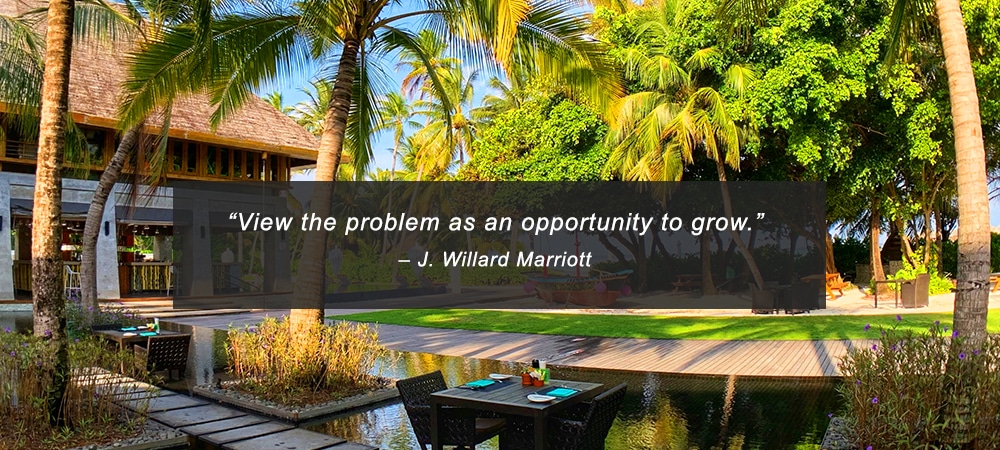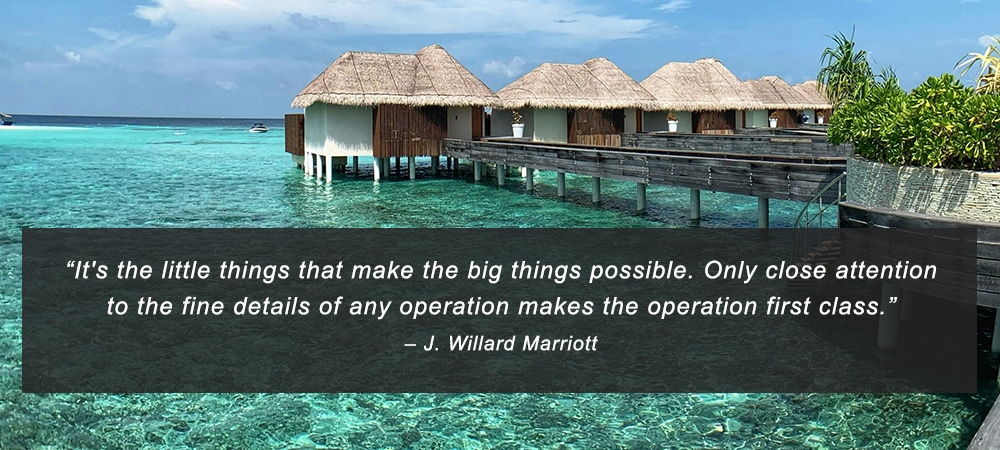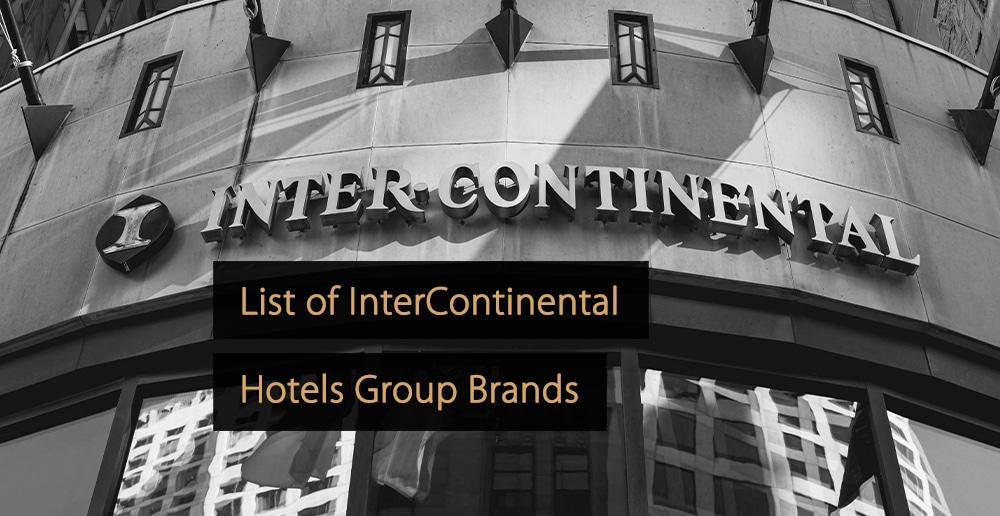The various Marriott hotel brands combine to make up the multinational corporation, Marriott International. These brands include hotels, resorts, and timeshare properties, with luxury, premium, midscale and extended stay options. Marriott International’s importance can be highlighted by the fact that it is currently the largest hotel company in the world by total rooms available. All in all, Marriott hotel brands provide more than 1.5 million guest rooms. In this article, you can learn more about Marriott International, its various brands, and the company’s key features.
Table of Contents:
- What Is Marriott International?
- What Is the Marriott Bonvoy Program?
- The Biggest and Most Important Marriott Hotel Brands
- Key Features and Qualities of Marriott Hotel Brands
- Exploring Other Top Hotel Brands
- Exploring the Biggest Hotel Chains
What Is Marriott International?
Marriott International is a large American hotel company that owns more than 30 different hotel and timeshare brands. These Marriott hotel brands include Marriott Hotels & Resorts, The Ritz-Carlton, and W Hotels. Marriott International is recognized as the largest hotel company in the world, as measured by the total number of guest rooms available to customers. In total, the company is responsible for over 8,700 locations.
This includes luxury hotels, premium hotels, extended-stay hotels, midscale hotels, apartments, and villas. The company was founded in 1927 in Washington, D.C., by J. Willard Marriott and Alice Marriott. Its headquarters is now located in Bethesda, Maryland. Marriott International is among the biggest employers in the hotel industry and the company has developed a strong reputation for innovation and providing great guest experiences.
What Is the Marriott Bonvoy Program?
Marriott Bonvoy is a customer loyalty program, which is completely free to join. Members can earn loyalty points and gain access to a variety of rewards. Loyalty points can be redeemed to claim free nights at Marriott International’s various hotels, gift cards, car rentals from Marriott’s partners, and more. Loyalty points can be earned from stays at any of Marriott’s hotel brands.
Customer rewards programs are one of the major marketing strategies used by hospitality companies. They help to generate repeat customs and can play a key role in social media marketing for hotels, too. In addition to the rewards earned through loyalty points, simply joining the free Marriott Bonvoy program provides members with access to free Wi-Fi at all Marriott locations, along with discounted room rates.
Video: Marriott Bonvoy
The Biggest and Most Important Marriott Hotel Brands
Marriott International has more than 30 hotel and timeshare brands in total. Below, you can learn about the biggest, most popular, and most significant Marriott hotel brands.
Marriott Hotels & Resorts
Marriott Hotels & Resorts is a premium, full-service hotel brand. It places a strong emphasis on comfort, innovation and utilizing the latest hotel technology to enhance the guest experience. The flagship Marriott hotel brand, Marriott Hotels & Resorts has more than 600 locations around the world, with more than 300 in North America. In total, the brand provides over 200,000 guest rooms. Marriott Hotels & Resorts was established in 1957 with the creation of the Marriott Motor Hotel in Virginia.
The Ritz-Carlton
The Ritz-Carlton is a luxury hotel brand, offering elegant sophistication and exceptional guest experiences. Its history dates back to 1898 and the creation of the Hôtel Ritz in Paris by the Swiss hotelier, César Ritz. All together, there are over 100 Ritz-Carlton luxury accommodation properties, spread across 30 different countries. The iconic brand was acquired by Marriott International in 1998. Ritz-Carlton remains one of the most important Marriott hotel brands. The brand is known for its high service standards, its willingness to adopt the latest hospitality trends, and its legacy of innovation.
Video: The Ritz-Carlton
St. Regis
St. Regis Hotels & Resorts is a luxury hotel brand owned and managed by Marriott International. This brand offers 5-star luxury and glamor and a signature butler service. The history of the St. Regis brand can be traced back to New York in 1904, with the St. Regis Hotel in the city emerging as a favorite with city elites. It has been a Marriott hotel brand since 2016. Today, there are more than 50 St. Regis hotels around the world, offering 10,000 guest rooms.
W Hotels
W Hotels is a luxury lifestyle hotel brand, which has been owned by Marriott International since 2016. Originally, the hotel chain was created by Starwood Hotels and Resorts in 1998. One of the most prestigious Marriott hotel brands, W Hotels is known for its focus on personalization, distinctive design, and adopting the latest hotel trends. W Hotels also feature living rooms, which serves as social hubs. There are currently more than 70 hotels and apartments operating under the W Hotels name.
Sheraton Hotels & Resorts
Sheraton Hotels & Resorts is a premium international hotel chain. The brand was established in 1937 and is renowned for innovation, introducing the world’s first automatic reservation system in the 1950s. Sheraton Hotels & Resorts is now one of the largest Marriott hotel brands, having been acquired by Marriott International in 2016. In total, the brand has properties in more than 450 locations. It is a consumer-driven brand with a strong international presence. In 1985, it became the first Western hotel brand to operate in China. A mid-range spinoff brand called Four Points by Sheraton was created in 2023.
Westin Hotels & Resorts
Westin Hotels & Resorts is an upscale hotel brand, which was founded in 1930 as Western Hotels. Today, it also includes the subsidiary brand Element By Westin, which offers long-stay hotels. In total, Westin Hotels & Resorts has over 200 properties, with more than 80,000 guest rooms. It is one of the biggest upscale Marriott hotel brands and has a presence in 40 countries, including countries in North America, Europe and Asia. One of the key elements of the brand is a focus on wellness and Westin Hotels is regarded as a pioneer in this area.
Design Hotels
Design Hotels is a major premium hotel brand with its headquarters in Berlin, Germany. Marriott International became the majority shareholder in 2016 and acquired the brand outright in 2021. Unlike other Marriott hotel brands, the Design Hotels portfolio is made up of privately owned and operated member hotels. Around 130 of the 300+ member hotels participate in the Marriott Bonvoy program. Although each member property operates under independent hotel management, all Design Hotels are united by a commitment to unique designs and an emphasis on providing original experiences.
Courtyard by Marriott
Courtyard by Marriott is a hotel brand that was established in 1983. There are currently more than 1,250 Courtyard by Marriott hotels in the world, providing close to 200,000 rooms. One of the most important select-service Marriott hotel brands, Courtyard by Marriott was originally designed to provide smaller hotels away from major travel hotspots. It primarily appeals to families and corporate travelers. Rooms in Courtyard by Marriott hotels provide workstations, comfortable bedding, and work-related hotel technology, including free Wi-Fi. Premium upgrades are available, including Enhanced Internet offering faster speeds.
Video: Courtyard by Marriott
SpringHill Suites
SpringHill Suites is an all-suites Marriott hotel brand, which targets leisure and business travelers. The brand was established in 1997 and places a focus on style and modernity. All in all, there are over 500 SpringHill Suites hotels, providing a total of more than 60,000 rooms. The vast majority of these properties are located in the United States, with some in Canada. Typical features include a spacious suite, with kitchen facilities and modern hotel technology.
AC Hotels by Marriott
AC Hotels by Marriott was founded in Spain in 1998 as AC Hoteles. It has been a Marriott hotel brand since 2011, with a commitment to comfort, simplicity, and modern, European-style design features. The brand has seen a significant expansion across North America since Marriott International acquired it. Today, there are over 200 AC Hotels globally, with 117 in North America. Signature features include AC Lounges, which serve as social hubs, and services for business travelers.
Key Features and Qualities of Marriott Hotel Brands
- Diverse Portfolio: Marriott hotel brands cover a variety of market segments, from luxury to extended stay and select-service hotels. This allows Marriott International to reach a vast audience.
- Marriott Bonvoy: A renowned, free-to-join customer rewards program, which offers various membership benefits and generates customer loyalty. Bonvoy members can also accumulate loyalty points to receive free stays or discounts.
- Digital Innovation: Marriott hotel brands make use of online booking engines, mobile apps, and various other digital technology solutions. This provides guests with convenience and improved experiences.
- Content Marketing: Marriott International creates and publishes interesting and useful content across different channels. Examples range from guides to advice articles and more overt travel and tourism marketing content.
- Personalization: Through the use of mobile apps, customer data, analytics and the Marriott Bonvoy program, the company offers tailored services for individuals, including intelligent recommendations.
- Sustainability Measures: Marriott International places a focus on social responsibility through its various sustainability initiatives, aiming to minimize the negative impacts of tourism.
- Local Integration: Despite having a global presence, Marriott hotel brands aim to integrate with local cultures.
- Collaboration: Marriott has a variety of strategic partnerships, including with car rental companies, airlines, credit card companies and other businesses in the travel and tourism sector.
Exploring Other Top Hotel Brands
Marriott hotel brands are among the biggest in the world, but there are a variety of other hotel brands, with examples including Hilton Worldwide Holdings, Accor, InterContinental Hotels Group, and Hyatt Hotels & Resorts. Each of these brands has established its own niche and reputation.
In the “List of the Excellent Hotel Brands to Work For“ article, you can explore these hotel brands and various others, learn what makes them all unique, and access information on applying for a job in the hotel industry.
Exploring the Biggest Hotel Chains
Away from Marriott hotel brands, there are a variety of top hotel chains, which serve as major employers for the industry. Examples of some of the biggest hotel chains applicants may wish to explore include Wyndham Hotels & Resorts, Best Western International, Jin Jiang International, and Radisson Hotels.
In the “List of Hotel Chains to Find Jobs in the Hotel Industry” article, you can explore the benefits of working for a major hotel chain and access a list of the biggest chains, complete with links to current job openings.
Marriott hotel brands are among the best-known hotel brands in the world, with examples including Marriott Hotels, The Ritz-Carlton and SpringHill Suites. Combined, Marriott International has more than 8,700 locations, catering to different types of guests. The Marriott hotel brand is also renowned for its Marriott Bonvoy rewards program.
Did You Like This Article About Marriott Hotel Brands?
You might also be interested in the following articles:
- IHG Hotel Brands: List of InterContinental Hotels Group Brands
- Hilton Hotel Brands: Learn About the Biggest Hilton Brands
- Hotel Association: Benefits of Joining for Hotel Owners
- Tour Agencies That Help Hotels To Grow Their Revenue
- AAA Travel Agency Overview, Services & Benefits for Hoteliers
More Tips to Grow Your Business
Revfine.com is the leading knowledge platform for the hospitality and travel industry. Professionals use our insights, strategies, and actionable tips to get inspired, optimize revenue, innovate processes, and improve customer experience.Explore expert advice on management, marketing, revenue management, operations, software, and technology in our dedicated Hotel, Hospitality, and Travel & Tourism categories.
This article is written by:
Hi, I am Martijn Barten, founder of Revfine.com. With 20 years of experience in the hospitality industry, I specialize in optimizing revenue by combining revenue management with marketing strategies. I have successfully developed, implemented, and managed revenue management and marketing strategies for individual properties and multi-property portfolios.










Leave A Comment